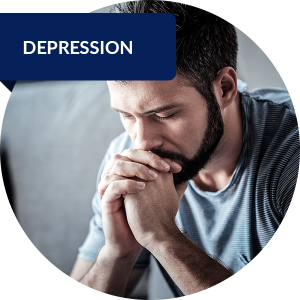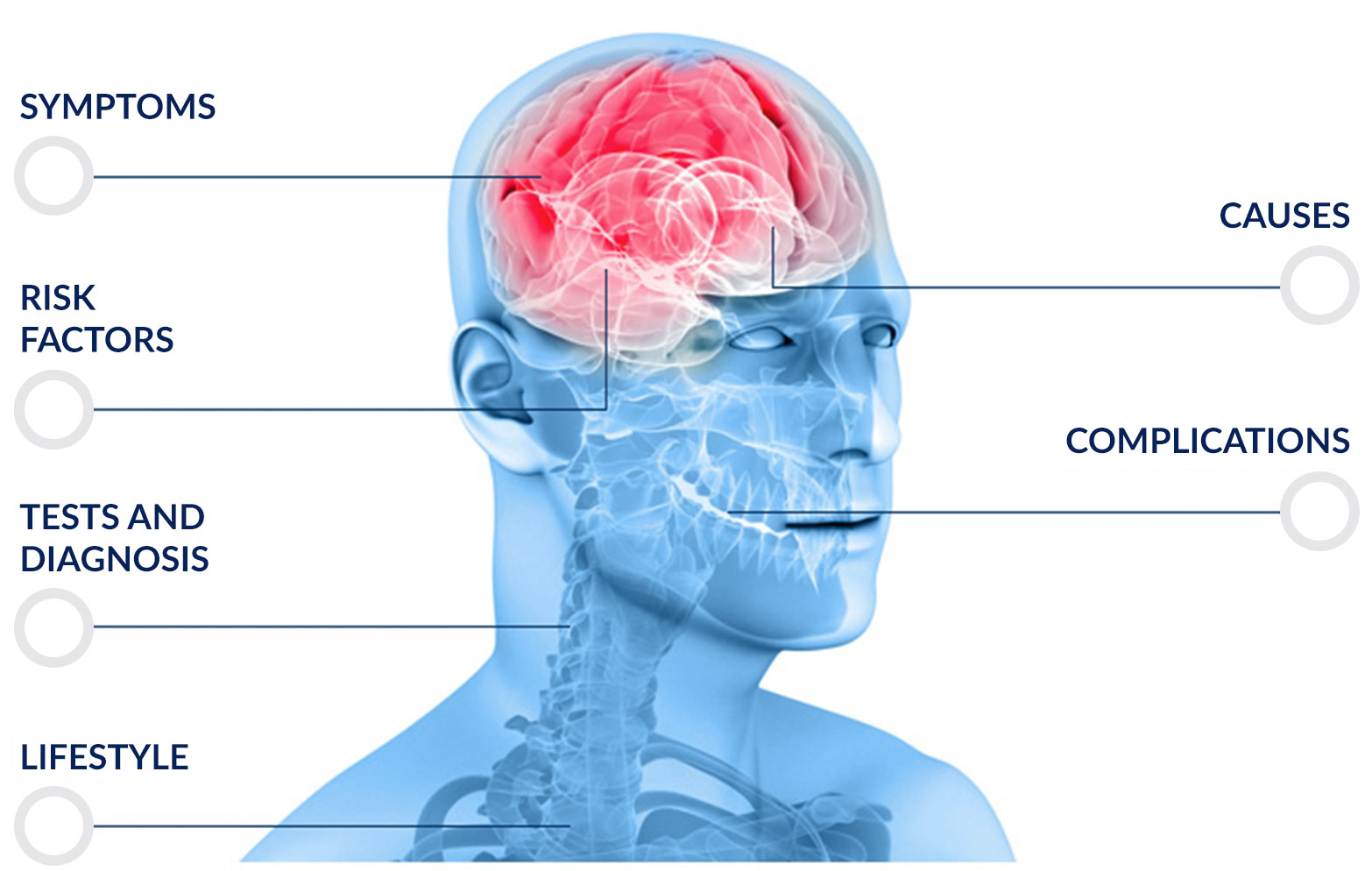
“Depression” indicates a state of psychological suffering, but it does not indicate a cause for this suffering. It is characterised by a generally low mood, although major depression is an actual pathology which causes a permanent state of sadness, associated with profound pessimism. Major depression and clinical depression can affect the individual’s mental state, thinking and behaviour.
Depression can lead to a variety of emotional and physical issues: from difficulties in performing normal day-to-day activities to suicidal thoughts.
Depression is a chronic illness that usually requires long-term pharmacological treatment, associated with psychological counselling.
Select to learn more

Symptoms
Symptoms of depression include:
- Feelings of sadness or unhappiness
- Irritability or frustration, even over small matters
- Loss of interest or pleasure in everyday activities
- Lower sex drive
- Insomnia or excessive sleeping
- Appetite changes; depression often causes reduced appetite and weight loss, but in some people it can lead to increased cravings for food and weight gain
- Agitation or restlessness
- Irritability or angry outbursts
- Slowed thinking, speaking or body movements
- Trouble concentrating, getting easily distracted
- Tiredness and lack of energy, so it may seem like even small tasks take extra effort
- Feelings of worthlessness or guilt, fixating on past failures or self-blame when things aren’t going well
- Trouble thinking, concentrating, making decisions and remembering things
- Frequent thoughts of suicide or death
- Crying fits for no apparent reason
- Unexplained physical problems, such as back pain or headaches
For many people with depression, symptoms usually are severe enough to cause noticeable problems Some people may feel generally miserable or unhappy without really knowing why.
Depression affects everyone in a different way; symptoms of depression can vary from person to person. Inherited tracts, age, sex, and cultural background all play a role in the way in which depression manifests and evolves.
Causes
It’s not known exactly what causes depression. As with many mental disorders, a variety of factors may be involved, such as: These include:
Biological changes. People with depression appear to have physical changes in their brains. The meaning of these changes is still unclear.
Neurotransmitters. Neurotransmitters are brain chemicals that are physiologically linked to mood and likely play a direct role in depression.
Hormones. Changes in the body’s balance of hormones may be involved in causing or triggering depression. Hormone changes can be caused by thyroid problems, menopause or a number of other conditions.
Inherited traits. Depression is more common in people whose blood relatives also have or have had this condition. Researchers are trying to identify the genes that may be involved in making someone more vulnerable to develop depression.
Life events. Some events, such as the loss of a loved one, financial troubles, or high levels of stress, may trigger depression in some people.
Childhood trauma. Traumatic events during childhood, such as sexual abuse or the loss of a parent, may cause permanent changes to the brain, making it more prone to depression.
Risk factors
Depression often begins in the early teens, 20s or 30s, but it can happen at any age. Twice as many women are diagnosed with depression than men, but this may be due in part to the fact that women are more likely to seek treatment for depression.
Even though the cause of depression is still unknown, research has identified factors that seem to increase the risk of developing or triggering depression, which include:
- Blood relatives with a history of depression
- Being a woman
- Childhood trauma
- Stressful life events, such as the death of a loved one
- Loneliness, having few friends or few interpersonal relations
- Having given birth recently (post partum depression)
- A previous diagnosis of depression
- A serious illness such as cancer, stroke, diabetes, heart diseases, Alzheimer’s, or HIV/AIDS
- Specific personality traits, such as having a low self-esteem, being excessively self-critical, or being a pessimist.
- Abuse of alcohol, nicotine, or recreational drugs
- Certain medications used to treat high blood pressure medications or sleeping pills, or other drugs
Complications
Depression is a serious disorder that can take a terrible toll on patients and their families. Depression often gets worse if left untreated, resulting in emotional, behavioural and health problems that affect every area of life. Examples of complications associated with depression include:
- Alcohol abuse
- Substance abuse
- Anxiety
- Problems at school or at work
- Family conflicts
- Difficulty socializing
- Social isolation
- Suicide
- Self-harm
- Premature death from other medical conditions
Tests and diagnosis
Physical examination. This can include measuring your height and weight, checking vital parameters such as heart frequency, blood pressure, and body temperature, listening to the heart and lungs, and examining the abdomen. This is done to check for an underlying medical condition which may be associated with depression.
Laboratory tests. Your doctor may do a blood test, a complete blood count or test your thyroid to make sure it’s functioning properly.
Psychological evaluation. In order to check for the presence of symptoms of depression, your doctor or therapist may ask about any thoughts, feelings and behaviour patterns that are typical of depression. They may ask about symptoms or similar episodes that may have affected you in the past. The doctor may request that you fill out a written questionnaire to give a more precise diagnosis and identify the the degree to which depression is affecting you.
Criteria used to diagnose depression
In order to diagnose major depression, signs and symptoms must fulfil the criteria listed by the Diagnostic and Statistical Manual of Mental Disorders (DSM). This handbook is published by the American Psychiatric Association, and it is used by psychiatrists and psychologists.
More than five out of six of the following symptoms must be present for a period of two weeks. At least one of the symptoms must be a depressed mood, or a loss of interest or pleasure.
These include:
- A depressed mood for most of the day, on most days, including a feeling of sadness, emptiness, and crying (in children and teenagers, a depressed mood can appear as constant irritability)
- Loss of interest or a feeling of disdain for most or all normal activities, for most of the day and almost every day
- A significant weight loss or weight gain without being on a diet
- Insomnia or sleeping too much
- Restlessness or slowed movements
- Fatigue or loss of energy
- Feelings of worthlessness or excessive self-deprecation
- Trouble making decisions, thinking or concentrating
- Frequent or recurrent thoughts of death, suicidal thoughts, suicide attempts
In order to diagnose a major depressive disorder, symptoms must be:
- not due to a mixed manic-depressive episodes related to a bipolar disorder
- severe enough to cause significant troubles to daily activities, such as work, school, social activities and social relations
- not caused by the direct effects of something else, such as drug abuse, medication, or a medical condition such as hypothyroidism
- not cause by grief, for example sadness after the loss of a loved one
Other conditions which may cause symptoms of depression include:
Adjustment disorder. Adjustment disorder is a severe emotional response to a distressing life event.
Bipolar disorder. This type of depression is characterized by mood swings that range from highs to lows. It is sometimes difficult to distinguish between bipolar disorder and depression, but it is important to do reach an accurate diagnosis in order to administer the correct treatment.
Cyclothymia. Cyclothymia, or cyclothymic disorder, is a milder type of bipolar disorder.
Dysthymia. Dysthymia is a less severe but more chronic form of depression.
Post-partum depression This type of depression affects new mothers. It usually develops from two weeks to six months after giving birth.
Psychotic depression. This is a sever form of depression which involves psychotic symptoms such as delirium or hallucination.
Seasonal affective disorder. This form of depression is related to season changes and a reduced exposure to sunlight.
- urinary, tachycardia, and confusion. Tricyclic antidepressants are known for causing weight gain.
- Monoamine oxidase inhibitors (MAOIs). MAOIs such as tranylcypromine and phenelzine may be prescribed typically when other drugs haven’t worked, because they can have serious side effects. Using MAOIs requires a strict diet because of dangerous (or even deadly) interactions with foods such as certain cheeses, pickles and wines, and some decongestant medications.
Psychotherapy
Psychological counselling is a key treatment for depression. Psychotherapy is a general term used for one of the methods used to treat depression. Psychotherapy is also known as talking therapy, counselling, or or psychosocial therapy.
Through these talking sessions, you will learn more about what may be causing your depression, in order to understand it better. It allows mental health professionals to identify unhealthy behavioural and thought changes, and to find the best way to tackle and solve problems and set realistic goals for your life. Psychotherapy can help gain a sense of happiness and control on life back, and it can contribute to relief symptoms of depression such as sadness and rage.
There are different types of psychotherapy which may be useful to treat depression. Cognitive-behavioural therapy is one of the most common treatments. This type of therapy helps patients identify negative behaviours and thoughts and replace them with healthy and positive ones.
Lifestyle
Stick to your treatment. Do not skip psychotherapy sessions. Even if you feel well, do not avoid taking your medication. If you stop taking it, symptoms of depression may come back. Learn about depression. Educating yourself about your conditions can motivate you to stick to your treatment.
Watch out for warning signs. Work with your doctor or therapist to learn what may be triggering your depressive symptoms. Make a plan, so that you know what to do if symptoms get worse. Speak to your doctors or therapist if you notice any changes in your symptoms.
Exercise. Physical exercise helps reduce symptoms o depression. Consider walking, jogging, swimming, gardening, or any other activity.
Avoid alcohol or illegal drugs. Alcohol and illegal drugs may seem to relieve the symptoms of depression, but in the long term they actually make your depression worse and make it harder to treat.
Sleep quality and quantity. Sleeping well is important for both physical and mental well-being.
Quantità e qualità del sonno. Dormire bene è importante sia per il fisico che per il benessere mentale.




